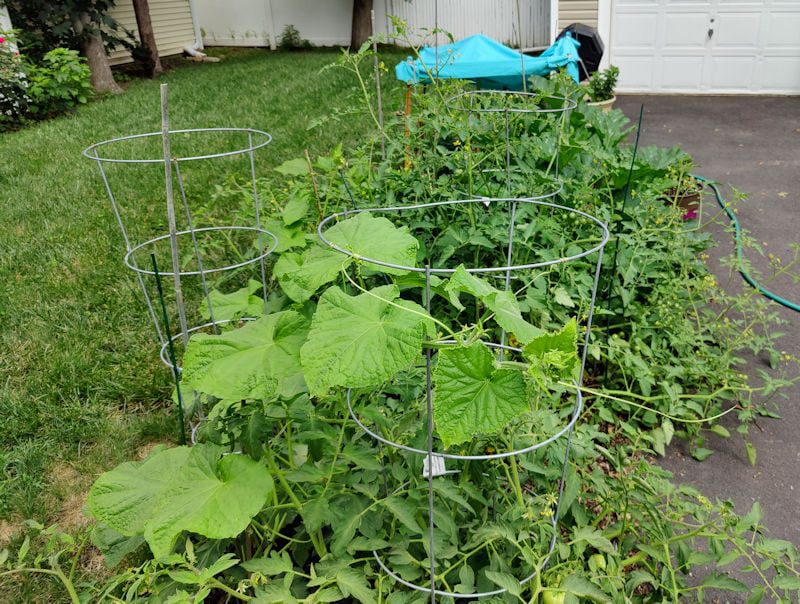Lust for Life, and Inevitable Empathy:
Going Beyond Ideas of Illness
Lust for Life, and Inevitable Empathy:
Going Beyond Ideas of Illness
The Plant Imperative
Nature is wonderful. Even a cucumber plant has its own intelligence and strives to find its place in the sun. And this connects to human behavior too! I will make the connection very soon.
It is hard to capture photographically the many, many clingers that this plant wraps around any solid object it can find. And why does it do this? So it can rapidly expand, soaring over the neighboring tomato plant, grabbing more sunlight.

On several occasions, I have placed thin clingers that were pointing into empty space (you can see a couple in the photographs), to instead touch lightly on a vertical stick or metal cone. Coming back several hours later, they were already wrapped around that object, ready to grow more heavy cucumbers and stretch out further.
Bugs and Slugs…
How does this relate to us, as human beings? Well, to bridge the gap, if you have been around a grassy back yard, perhaps with bushes growing, and even moreso a vegetable garden, you will find the clever insects that hide under leaves or in hidden corners, waiting for dark, waiting for moisture so they can safely walk, or crawl in the case of snails and slugs.
And when they are disturbed, because I make a move to pick them up in order to move them away from the vegetable garden, you can see these insects and other wild creatures choosing a strategy: either stay totally still and try to evade detection by a presumed predator, or run like heck to a better hiding place.
If plants and insects and other small animals have strategies to survive, then even more fully we humans do.
That is why psychological labels need to be used in a very limited, careful way. Why? Because everything we do is an attempt to make more sense of the world, and to better survive.
Going Beyond Ideas of Illness
There are books written, for example, about how what is called ADD or ADHD can be seen as a biological strength in evolution for those who are meant to be great hunters, helping the human gene pool.
Those individuals are not so attuned to sitting still (e.g. in a school classroom) but are terrific in hunting wild animals or perhaps more appropriate for most of us these days, running a busy business or serving multiple customers, and tracking a rapidly changing environment.
Rather than pathologize and fight the ADD or ADHD behaviors, the environment should provide support and encouragement aligned with the skills those individuals exhibit. I know this… my older son was one of those individuals! He is currently working on nuclear fusion, which may one day provide unlimited, clean, carbon-free energy to the world. But it required meaningful support from “the village”—including a handful of perceptive, caring teachers and kind summer-job employers—to help him find his way, as most of society’s educational systems are focused on children sitting still and following every instruction.
And more in the realm of psychology, what about individuals who get agitated, critical, and aggressive when things are not going the way they would like? Is it possible those expressions are an attempt, learned earlier in life, to be heard and to receive what is needed in order to feel balanced and at peace?
The psychotherapist Marshall Rosenberg said, “Every criticism, judgment, diagnosis, and expression of anger is the tragic expression of an unmet need.” He uses the word “tragic” because such expressions of unmet needs generally do not attain for the individual what it is that they really want and need, unless those expressions are received with empathy by another individual and reflected back in a way that promotes growth, not shaming.
We can see each behavior or belief system in others, whether well-attuned or not so well-attuned to the moment, as an attempt to find meaning and success in the world, and to survive physically and psychologically.
When we see that reality of our human nature, for all of us, we can be compassionate for ourselves and others. And we can all use more of that, can’t we?

